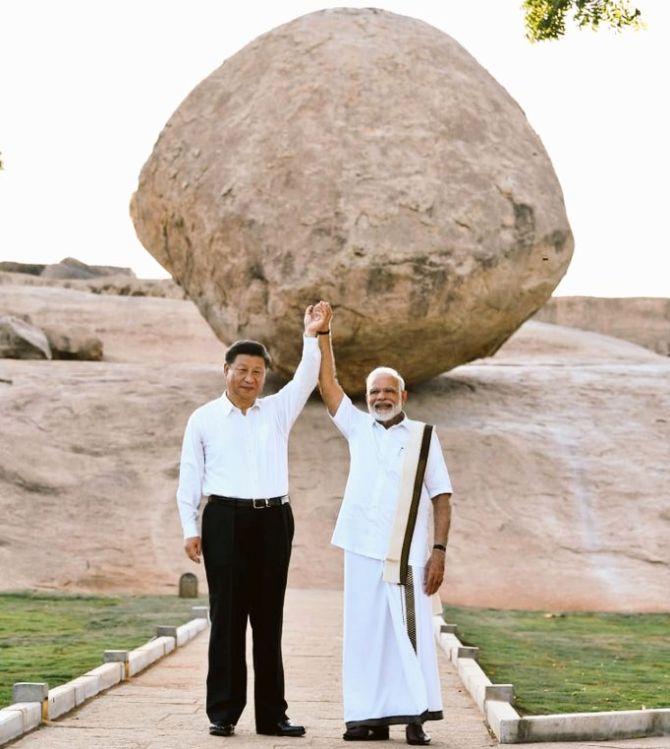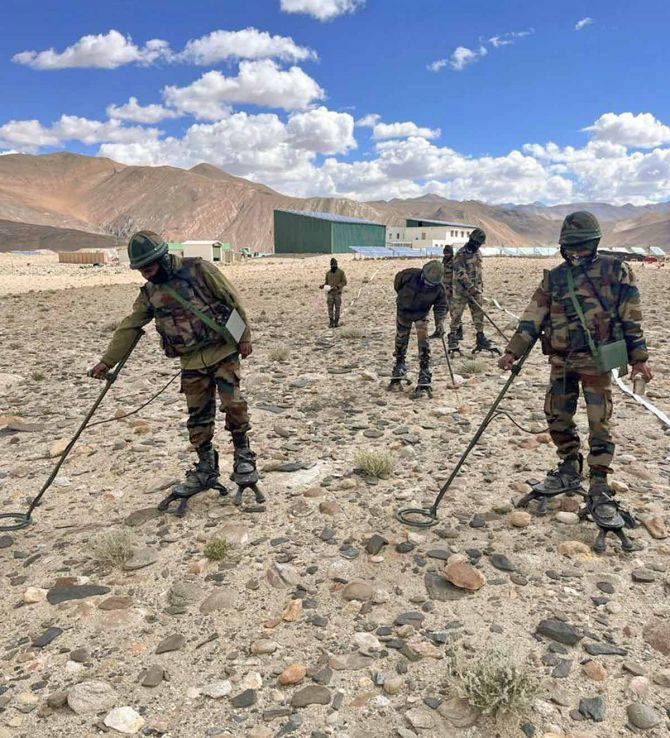'My understanding is that by the time President Xi Jinping came for the Chennai summit [2019], he had already instructed his army to undertake the action in Galwan in the summer of 2020.'

If there is a diplomat who deeply understands the intricacies and complexities of India-China relations, it is Ambassador Gautam Bambawale.
India's former ambassador to China, Ambassador Bambawale served four tenures in China in his nearly 35 years in the Indian Foreign Service. He speaks fluent Mandarin and is an expert on China.
He is only one of three Indians this century to have served India's ambassador to China and Pakistan -- Ambassador Vijay Nambiar and Ambassador Shiv Shankar Menon being the others.
Four years after the Chinese offensive in Galwan as India-China relations remain in very bad shape, he feels the relationship will continue to deteriorate unless the Chinese untie the knot.
"The Chinese thought they could muscle their way in, but India's military-politico-diplomatic response has been very good," Ambassador Bambawale tells Rediff.com's Archana Masih and Nikhil Lakshman in a multi-part interview.
Four year after the Galwan offensive, have you deciphered the reasons why the Chinese incursion took place in Eastern Ladakh?
One of the factors behind China's offensive action in Eastern Ladakh was the asymmetry of power between China and India.
Chinese GDP in the summer of 2020 was about 17 trillion dollars; India was about 3.5 trillion dollars. Therefore, the power differential between the two countries was sizable enough for them to meet the necessary condition to be assertive.
The Chinese thought they could muscle their way in, but India's military-politico-diplomatic response has been very good. Therefore, we have been able to keep China at bay.
What are some of the political steps that helped keep China at bay?
The ban on Chinese foreign direct investment in 5G and on mobile apps are some examples of the right political response by India.
External Affairs Minister Dr S Jaishankar has said that India-China relations are in a bad space and will not improve unless China takes some measures.
After India conducted the nuclear tests in 1998, the Chinese had said: 'The one who ties the knot has to untie it'.
At that time, India had tied the knot when then prime minister Atal Bihari Vajpayee wrote a letter to (then US) President Bill Clinton explaining the reason behind the tests.
This time, the Chinese have tied the knot and they must untie it.
The relationship cannot move ahead unless they do so.
The Government of India has stood firm and should continue to remain steadfast. The firmness is also evident on the border. The Northern Army Commander has said that our troops have remained on the frontline even through the winter.
There was recent news about two clashes that took place between the troops on the LAC. Therefore, India has to stay firm -- politically, diplomatically and militarily.
Do you think the foreign minister has rightfully called out China, something that has not been done before?
It is a fact. Anyone who does not say so is delusional because the relationship is in very bad shape. India-China ties have deteriorated and will continue to deteriorate unless the Chinese do not untie the knot.

Do you think China will make any effort to untie the knot?
I don't think they will. It will continue to deteriorate and that is where we are unfortunately.
Diplomacy means speaking the truth and Dr Jaishankar is right in telling the country that India-China relations are in a bad place.
You were pivotal in negotiating the Wuhan Agreement five years ago and had foreseen better India China relations.
When you served as India's ambassador in China, did you get the feeling that winds were changing?
The first informal summit between India and China was in Wuhan in April 2018, and second was in Chennai in October 2019.
My understanding is that by the time President Xi Jinping came for the Chennai summit, he had already instructed his army to undertake the action in Galwan in the summer of 2020.
This can give us a sense of how Xi thinks.

Wuhan was seen as a big breakthrough in India-China relations. How did it resolve the Dokalam standoff?
Dokalam was one of the series of incidents that brought home to India that India-China and the world had changed.
The old rubric for India-China relations which had been put together by Rajiv Gandhi's visit to China in December 1988 had served us well, but that template was no longer tenable.
The two summits were an attempt to initiate a new rubric or template so that India-China relations could continue to move forward despite the difficulties and tension.
It was evident that it would need more than just two rounds of meetings between the leaders to arrive at a new rubric. Unfortunately, Xi Jinping had already made up his mind militarily by the second summit.
The basis of a good relationship is peace on the border, but since China moved its troops in forward positions in 2020, the relationship could not move forward.
Today, there are hardly any government to government meetings between India and China except the military talks at the border -- or on the sidelines of international summits.
A plethora of interactions had been planned, but that has fallen by the wayside.
This breakdown is impacting other areas like FDI. The Government of India has put stringent security considerations into Chinese investments in India. India has ensured that Chinese investment goes through several hoops and layers before it is approved - and a lot hasn't been approved.
Trade hasn't been cut down because certain imports go into our own exports and the government has been practical.

Were any concessions made in Wuhan to resolve the Dokalam crisis?
There was no question of concessions at all. Dokalam had been resolved earlier. The effort in the two summits was to find a way to handle the relationship and move forward, but it did not get a chance.
Do you think the relationship started deteriorating long before that? Former Foreign Secretary Shyam Saran wrote that Indian diplomats had noticed a change in the Chinese attitude from 2012 itself.
Many of us saw it. We definitely felt there was a possibility of the Chinese getting aggressive, not only with India but with other countries as well.
Their position in the world was strengthening because of the size of their economy and the asymmetry of power between them and other countries, including India.
India needs to reduce this asymmetry -- economic, technological, scientific and military - and increase its comprehensive national power.

Since the relations between the two countries are in poor shape and expected to deteriorate further, what is the possibility of reverting to status quo ante pre 2020?
The action taken by China in Eastern Ladakh changed the status quo. According to newspaper reports there are certain patrolling points and routes that the Indian Army cannot patrol anymore because the Chinese are sitting at those junctions.
Since there is no agreed boundary, you should not ask whether India has lost territory or whether China has lost territory. You must ask whether the status quo has changed and the answer is yes.
India should stick to its position of demanding a restoration of status quo ante and continue talks after that.
- Part 2 of the Interview: 'We have taught the Chinese some lessons'
Feature Presentation: Aslam Hunani/Rediff.com










